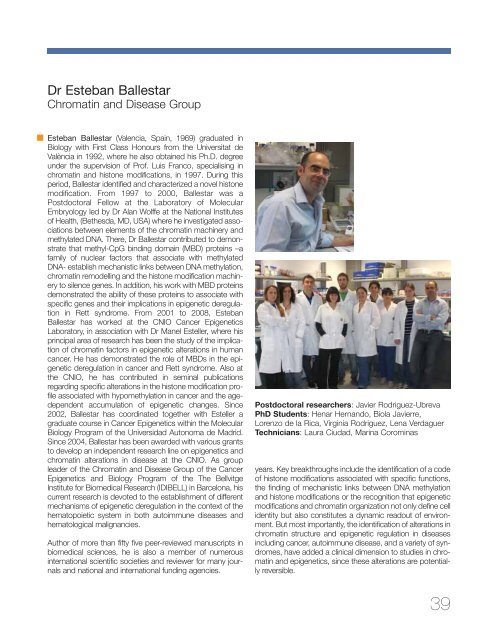PEBC Report - Programa de Epigenética y BiologÃa del Cáncer
PEBC Report - Programa de Epigenética y BiologÃa del Cáncer
PEBC Report - Programa de Epigenética y BiologÃa del Cáncer
Create successful ePaper yourself
Turn your PDF publications into a flip-book with our unique Google optimized e-Paper software.
Dr Esteban Ballestar<br />
Chromatin and Disease Group<br />
Esteban Ballestar (Valencia, Spain, 1969) graduated in<br />
Biology with First Class Honours from the Universitat <strong>de</strong><br />
València in 1992, where he also obtained his Ph.D. <strong>de</strong>gree<br />
un<strong>de</strong>r the supervision of Prof. Luis Franco, specialising in<br />
chromatin and histone modifications, in 1997. During this<br />
period, Ballestar i<strong>de</strong>ntified and characterized a novel histone<br />
modification. From 1997 to 2000, Ballestar was a<br />
Postdoctoral Fellow at the Laboratory of Molecular<br />
Embryology led by Dr Alan Wolffe at the National Institutes<br />
of Health, (Bethesda, MD, USA) where he investigated associations<br />
between elements of the chromatin machinery and<br />
methylated DNA. There, Dr Ballestar contributed to <strong>de</strong>monstrate<br />
that methyl-CpG binding domain (MBD) proteins –a<br />
family of nuclear factors that associate with methylated<br />
DNA- establish mechanistic links between DNA methylation,<br />
chromatin remo<strong>de</strong>lling and the histone modification machinery<br />
to silence genes. In addition, his work with MBD proteins<br />
<strong>de</strong>monstrated the ability of these proteins to associate with<br />
specific genes and their implications in epigenetic <strong>de</strong>regulation<br />
in Rett syndrome. From 2001 to 2008, Esteban<br />
Ballestar has worked at the CNIO Cancer Epigenetics<br />
Laboratory, in association with Dr Manel Esteller, where his<br />
principal area of research has been the study of the implication<br />
of chromatin factors in epigenetic alterations in human<br />
cancer. He has <strong>de</strong>monstrated the role of MBDs in the epigenetic<br />
<strong>de</strong>regulation in cancer and Rett syndrome. Also at<br />
the CNIO, he has contributed in seminal publications<br />
regarding specific alterations in the histone modification profile<br />
associated with hypomethylation in cancer and the age<strong>de</strong>pen<strong>de</strong>nt<br />
accumulation of epigenetic changes. Since<br />
2002, Ballestar has coordinated together with Esteller a<br />
graduate course in Cancer Epigenetics within the Molecular<br />
Biology Program of the Universidad Autonoma <strong>de</strong> Madrid.<br />
Since 2004, Ballestar has been awar<strong>de</strong>d with various grants<br />
to <strong>de</strong>velop an in<strong>de</strong>pen<strong>de</strong>nt research line on epigenetics and<br />
chromatin alterations in disease at the CNIO. As group<br />
lea<strong>de</strong>r of the Chromatin and Disease Group of the Cancer<br />
Epigenetics and Biology Program of the The Bellvitge<br />
Institute for Biomedical Research (IDIBELL) in Barcelona, his<br />
current research is <strong>de</strong>voted to the establishment of different<br />
mechanisms of epigenetic <strong>de</strong>regulation in the context of the<br />
hematopoietic system in both autoimmune diseases and<br />
hematological malignancies.<br />
Author of more than fifty five peer-reviewed manuscripts in<br />
biomedical sciences, he is also a member of numerous<br />
international scientific societies and reviewer for many journals<br />
and national and international funding agencies.<br />
Postdoctoral researchers: Javier Rodriguez-Ubreva<br />
PhD Stu<strong>de</strong>nts: Henar Hernando, Biola Javierre,<br />
Lorenzo <strong>de</strong> la Rica, Virginia Rodriguez, Lena Verdaguer<br />
Technicians: Laura Ciudad, Marina Corominas<br />
years. Key breakthroughs inclu<strong>de</strong> the i<strong>de</strong>ntification of a co<strong>de</strong><br />
of histone modifications associated with specific functions,<br />
the finding of mechanistic links between DNA methylation<br />
and histone modifications or the recognition that epigenetic<br />
modifications and chromatin organization not only <strong>de</strong>fine cell<br />
i<strong>de</strong>ntity but also constitutes a dynamic readout of environment.<br />
But most importantly, the i<strong>de</strong>ntification of alterations in<br />
chromatin structure and epigenetic regulation in diseases<br />
including cancer, autoimmune disease, and a variety of syndromes,<br />
have ad<strong>de</strong>d a clinical dimension to studies in chromatin<br />
and epigenetics, since these alterations are potentially<br />
reversible.<br />
39


